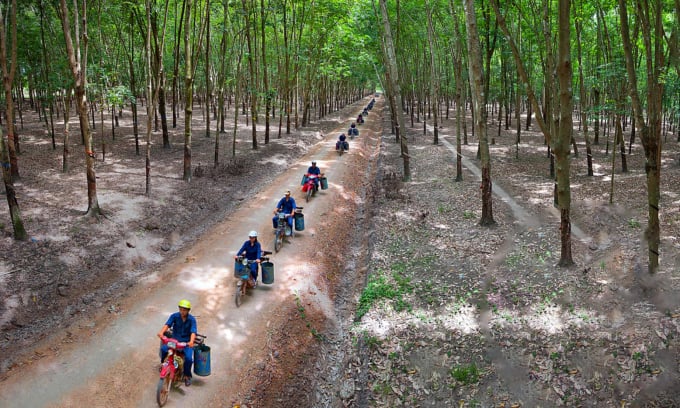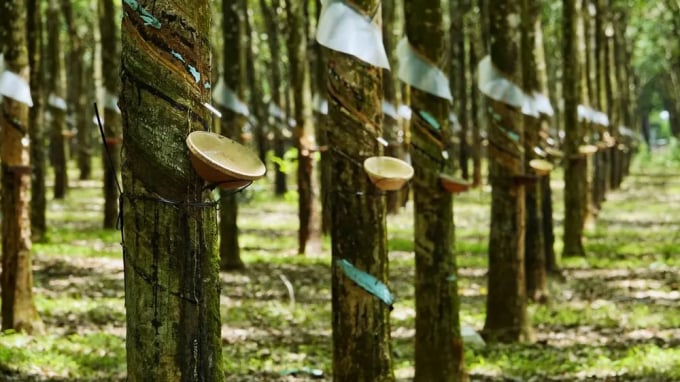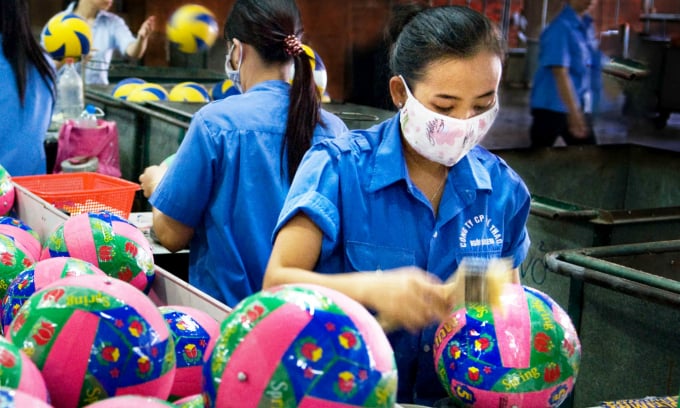November 25, 2025 | 08:56 GMT +7
November 25, 2025 | 08:56 GMT +7
Hotline: 0913.378.918
November 25, 2025 | 08:56 GMT +7
Hotline: 0913.378.918

Workers exploit rubber latex at the plantation.
The year 2021 is regarded as a pivotal year, with many big turning points for natural rubber and sustainable rubberwood. Firstly, the Vietnam Rubber Group (VRG) has implemented a pilot project on the certification of sustainable forest management following the VFCS/PEFC standards for rubber forests.
Up to now, 55,000 ha of rubber forests have been certified VFCS/PEFC, and it is expected to reach 100,000 hectares in the first quarter of 2022. With these existing certified areas, 85,000 tons of natural rubber and 300,000 tons of certified sustainable rubberwood will be harvested and ready for production and trade.
Secondly, the factor that helps increase the value of the rubber exploitation chain is about the participation of the Weber & Schaer company. By obtaining the PEFC chain certification for natural rubber materials, the German enterprise has become one of the first companies to bring certified natural rubber to consumers.
"Thanks to VRG's certification of sustainable forest management on a large scale, the company has more incentive to achieve PEFC certification. This is the first time that Weber & Schaer has been able to purchase a large amount of certified raw materials," said a Weber & Schaer representative.
A trend of green consumption and choice of quality products with traceability is more and more popular in the world. Along with that trend, a flow of environmentally friendly rubber materials certified by reputable suppliers will “trigger” the buyers’ recognition.
PEFC is the largest forest certification system in the world. It is a choice for small forest owners, with more than 300 million ha across 49 national systems meeting its sustainability standards.
Headquartered in Geneva, Switzerland, PEFC is recognized for its role in providing independent assessment, validation, and accreditation of national forest certification systems. It has extensive relationships with stakeholders throughout Southeast Asia- the major producer of natural rubber in the world.
PEFC's commitment is always ready to support units in the supply chain. Its online system can be assessed at: https://rubber.pefc.org/.

Besides raw wood, rubber latex can also have more output in the market after obtaining a sustainable forest management certificate.
Vietnam is one of the Southeast Asian countries that enjoys pilot projects to support sustainable rubber and is certified by the PEFC International Forest Certification System.
In 2021, dozens of new sustainable forest management and PEFC Chain of Custody certificates will be issued for forest owners, purchasing companies and natural rubber and rubberwood processing factories.
Moreover, PEFC has certified in groups for 1,500 rubber plantations in Thailand (expected to be issued in the first quarter of 2022), expanded the chain of custody certification for rubberwood in Malaysia, brought into the market the new Vietnam’s certified rubber supplying sources as well as boost online connection with potential partners.
PEFC’s efforts are based on the fact that 85% of the world's natural rubber comes from Southeast Asia, with a majority of production belonging to millions of rubber smallholders.
The PEFC representative said the organization understood the complexity of the rubber products value chain and the challenges that small-scale producers face. Therefore, adopting sustainable production methods will require time to be effective in practice, he added.

A production line for rubber balls in Vietnam.
The achievements of the rubber industry in particular, and the certification of sustainable forest management in general, took place in the year that environmental issues and climate change were particularly concerned. At COP 26, most of the participating countries agreed on the need for a carbon-neutralized economy.
This is a process that the eco-friendly rubber industry can contribute partly to the common goal. According to PEFC, sustainably managed rubber forests can reduce carbon emissions by reducing deforestation and improving forest management.
Nature-based methods have proven to be optimal for achieving the "Zero Carbon" target, at the same time helping humans reduce their dependence on fossil fuels used for synthetic rubber production.
Besides environmental contribution, natural rubber is also an essential material for creating over 40,000 products, and is part of a supply chain worth USD300 billion annually, helping create jobs for millions of laborers. Among these, smallholder farmers are particularly interested in PEFC, as they themselves are easily affected by price and market fluctuations.
Identifying sustainable rubber exploitation chains associated with improving the livelihoods of smallholders and the environment, PEFC requires raw material suppliers to make a commitment to achieve VFCS/PEFC sustainable forest management certification.
For processors, the organization recommends them to increase the use of sustainable raw materials and achieve PEFC Chain of Custody certification. Retailers of products made from natural rubber and rubberwood are also instructed to implement a responsible and comprehensive purchasing policy for a healthy and humane ecosystem.
Following the results achieved in 2021, PEFC plans to organize a series of webinars, with the participation of speakers from suppliers such as VRG and the Thai Forest Certification Council (TFCC). In addition, it promotes the consumption chain by connecting with pioneer companies such as Weber & Schaer and Unilin to ensure the sustainability of the value chain.
Translated by Linh Nguyen

(VAN) Green transition is crucial for the Mekong Delta amid climate change and stricter standards, offering a path toward sustainability.

(VAN) Dong Thap promotes agricultural restructuring, forms large specialized farming zones, raises the value of agricultural products and develops toward ecological and high-tech directions.
/2025/11/22/4018-4-213342_747.jpg)
(VAN) The Mekong Delta Agricultural Experts Club has attracted 143 experts and researchers to participate in providing consultancy and contributing initiatives to the development of one million hectares of high-quality rice.

(VAN) Ca Mau’s development of OCOP products opens a path to increasing cooperatives value, helping boost income, expand markets, and affirm collective economy's role.

(VAN) Turning seemingly ordinary coconut shells into unique jewelry and artwork, Nguyen Bang Nhi spreads the value of local culture through her brand, Cocohand.

(VAN) Results from the Sustainable Durian Model Project in Dak Lak have confirmed the critical role of Yara Viet Nam in transferring advanced nutritional solutions to farmers.

(VAN) In Tuyen Quang province, livestock farmers have introduced effective models and innovative practices that significantly strengthen African Swine Fever prevention and control efforts.